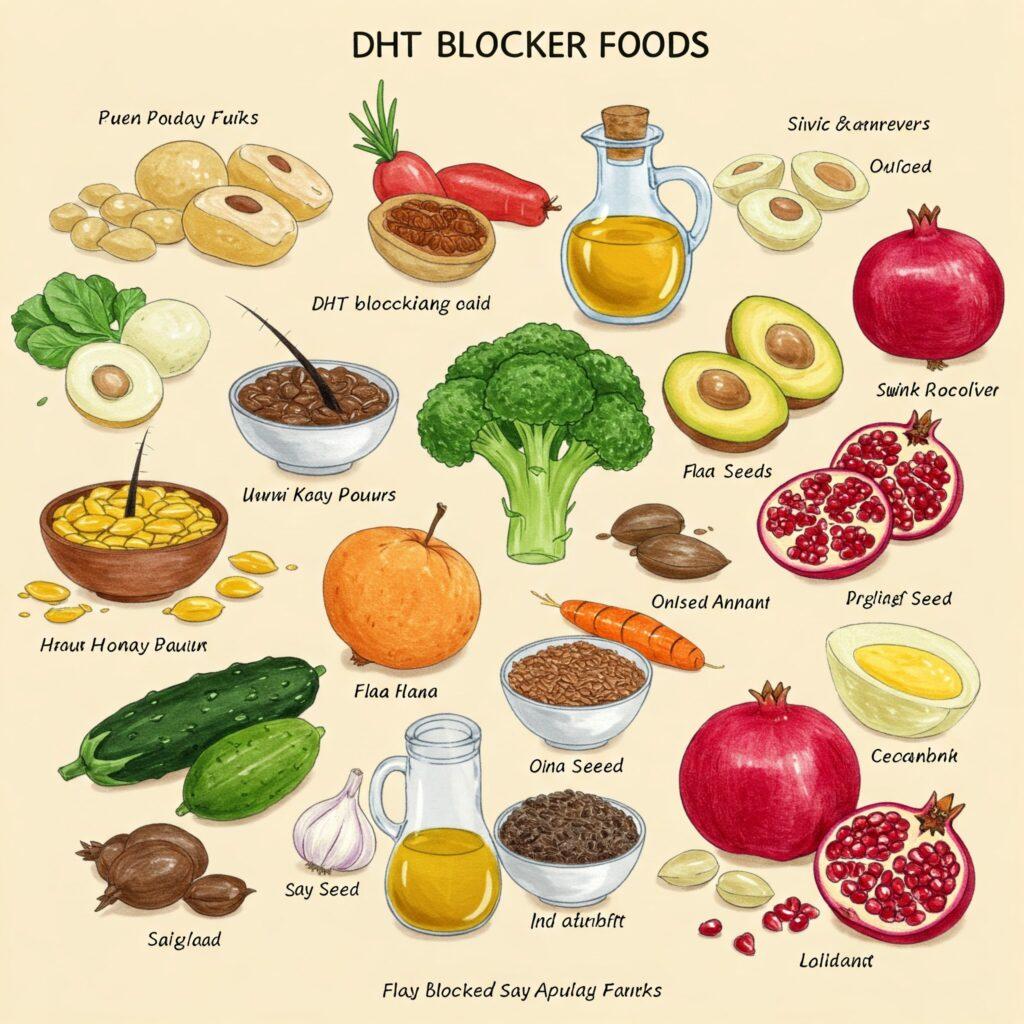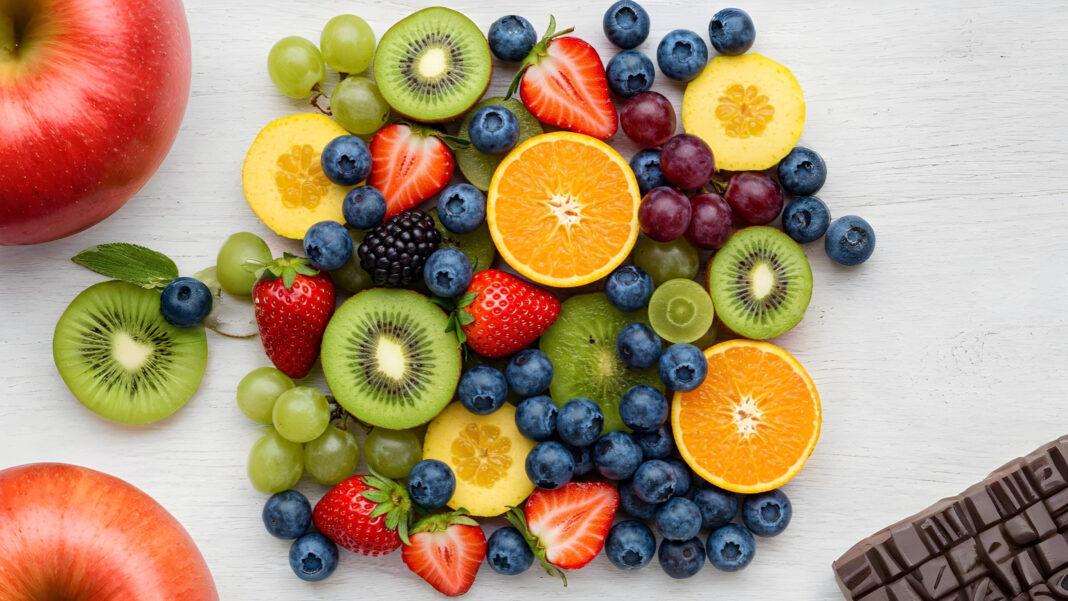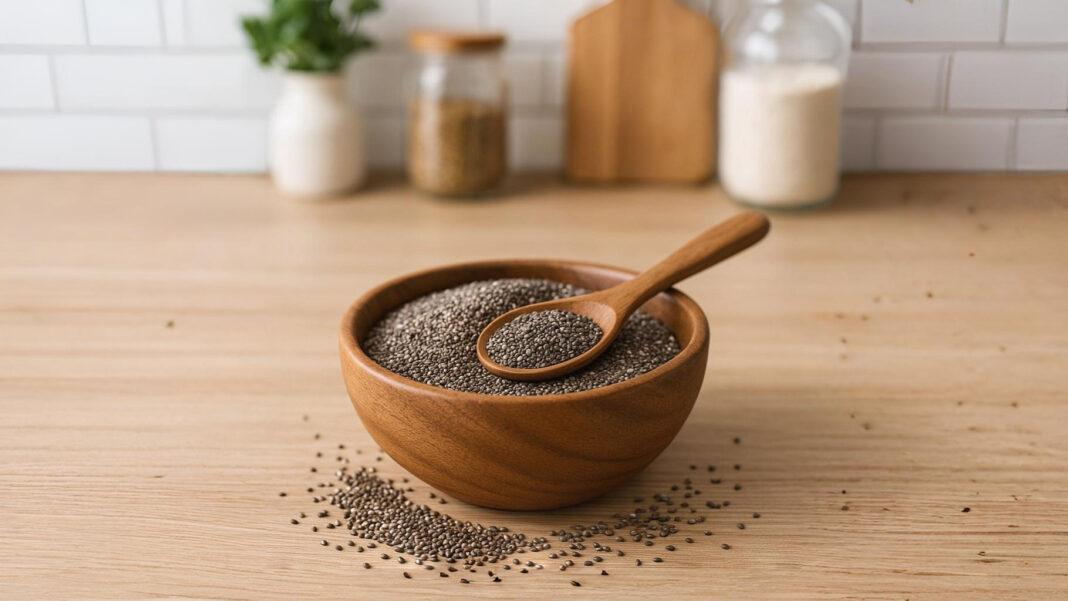Hair loss affects millions of people worldwide. It often leads to emotional distress and a quest for solutions. A major factor in hair loss, especially male pattern baldness, is DHT Blocker Foods (DHT). This hormone comes from testosterone. Some people use medical treatments like finasteride and minoxidil. Others prefer natural options, such as foods that block DHT.

Contents
- Understanding DHT
- DHT and Hair Loss
- Methods to Block DHT
- DHT Blocker Foods: Mechanisms, Benefits, and Evidence
- Additional Natural Remedies
- Foods to Avoid
- Lifestyle Changes to Complement DHT Blocker Foods
- Cautions and Considerations
- FAQs on DHT Blocker Foods
- u003cstrongu003eAre DHT blocker foods effective for everyone?u003c/strongu003e
- u003cstrongu003eCan I rely solely on diet to manage DHT-related hair loss?u003c/strongu003e
- u003cstrongu003eAre there any risks associated with consuming DHT blocker foods?u003c/strongu003e
- u003cstrongu003eHow long does it take to see results from DHT blocker foods?u003c/strongu003e
- u003cstrongu003eCan DHT blocker foods interact with other medications or treatments?u003c/strongu003e
- u003cstrongu003eAre there specific diets or meal plans that incorporate DHT blocker foods?u003c/strongu003e
- u003cstrongu003eu003cstrongu003eHow do DHT blocker foods compare to other hair loss treatments?u003c/strongu003eu003c/strongu003e
- u003cstrongu003eCan women benefit from DHT blocker foods as well?u003c/strongu003e
- Conclusion
Understanding DHT
DHT, or Dihydrotestosterone, is an androgen hormone. It forms when the enzyme 5-alpha reductase converts about 10% of testosterone into DHT each day. This hormone is vital for developing male traits, like facial hair, muscle mass, and prostate growth. It also plays a key role in fetal development for male genitalia. However, in those with a genetic predisposition, DHT can harm scalp hair follicles. This can result in hair thinning and loss, known as androgenetic alopecia.
DHT and Hair Loss
DHT drives androgenetic alopecia in both men and women. However, it is more common in men because they have higher testosterone levels. The mechanisms by which DHT contributes to hair loss include:
- Follicle Miniaturization: DHT attaches to receptors on hair follicles. This causes them to shrink. As a result, they can’t produce thick, healthy hair as well.
- Shortened Growth Cycle: DHT shortens the anagen (growth) phase of the hair cycle, leading to shorter, thinner hair and eventual loss.
- Genetic Sensitivity: People with a genetic tendency for DHT sensitivity tend to lose hair more quickly. This often begins with a receding hairline or thinning at the crown.
This condition has led to interest in blocking DHT. Some strategies include dietary changes with certain foods.
Methods to Block DHT
DHT can be managed through medical or natural approaches:
- Prescription Medications:
- Finasteride (Propecia): An oral medication that inhibits 5-alpha reductase, reducing DHT levels. It can improve hair count within 12 weeks but may cause side effects like erectile dysfunction or breast tenderness.
- Minoxidil (Rogaine) is a topical treatment. It helps hair grow by increasing blood flow to the follicles. However, it does not directly block DHT.
- Natural Remedies:
- Foods: Certain foods may inhibit 5-alpha reductase or protect hair follicles from DHT’s effects.
- Supplements: Biotin, saw palmetto, and pygeum bark may support hair health, though evidence is limited.
Natural approaches, like DHT blocker foods, are popular. They are accessible, cost-effective, and have fewer side effects. While medications can be stronger, many prefer these natural options.
DHT Blocker Foods: Mechanisms, Benefits, and Evidence
Several foods are believed to block DHT or support hair growth due to their nutrient content. Here’s a closer look at these foods. It covers how they work, their benefits, any cautions, and the latest research findings.
Green Tea
- Mechanism: Contains epigallocatechin gallate (EGCG), which may inhibit 5-alpha reductase and has anti-inflammatory and antioxidant properties.
- Benefits: May protect hair follicles, stimulate hair growth, boost immune function, and reduce oxidative stress, which can contribute to hair loss.
- Cautions: Limited human studies on dietary intake’s DHT-blocking effects. High doses of green tea supplements may cause liver damage, particularly in post-menopausal women.
- Research: Preclinical studies suggest EGCG protects hair follicles and promotes growth, but human trials are needed.
Pumpkin Seeds
- Mechanism: Rich in zinc and beta-sitosterol, which may inhibit 5-alpha reductase. Pumpkin seed oil, when applied topically, has shown DHT-blocking effects.
- Benefits: May increase hair growth and prevent female pattern hair loss. Zinc supports hair tissue repair and scalp health. A 2014 study found that 400 mg of pumpkin seed oil daily increased hair growth by 30% in men with pattern baldness.
- Cautions: Most studies focus on topical pumpkin seed oil, not oral consumption. More human trials are needed for dietary effects.
- Research: Human studies show topical pumpkin seed oil improves hair growth, but oral effects are less clear.
Onions
- Mechanism: Has quercetin, a flavonoid that might block 5-alpha reductase and reduce oxidative stress.
- Benefits: May block DHT, promote hair regeneration, and reduce scalp inflammation. Onions are also rich in sulfur, essential for keratin production.
- Cautions: No human studies on eating onions or quercetin supplements for DHT reduction.
- Research: Preclinical studies show quercetin’s potential, but human evidence is lacking.
Turmeric
- Mechanism: Curcumin, the active compound, may block 5-alpha reductase and has anti-inflammatory properties.
- Benefits: May lower DHT levels and reduce scalp inflammation, supporting hair health.
- Cautions: Only preclinical studies are available. High doses of curcumin supplements can cause stomach problems.
- Research: Human studies are needed to confirm efficacy.
Edamame (Soybeans)
- Mechanism: Contains isoflavones that may block 5-alpha reductase. A 2007 study showed soy protein reduced DHT levels more than milk protein.
- Benefits: May lower DHT levels and support hair growth, particularly in women due to estrogen-like effects.
- Cautions: Effects diminish after 6 months; more studies are needed. Soy may interact with medications or hormones.
- Research: Limited human studies show promise but lack long-term data.
6. Coconut Oil
- Mechanism: Lauric acid, a medium-chain triglyceride, may block DHT in preclinical studies.
- Benefits: Topical application may prevent hair loss and nourish the scalp.
- Cautions: No human clinical studies; evidence is from test-tube and animal studies.
- Research: Promising but not yet recommended for treatment without further studies.
Egg Yolks
- Mechanism: High in biotin, which supports keratin production. Biotin deficiency is linked to hair loss.
- Benefits: May prevent hair loss due to biotin deficiency and support overall hair health.
- Cautions: Limited evidence on direct DHT-blocking effects.
- Research: Biotin’s role in hair loss is established, but DHT-specific effects are unconfirmed.
| Food | Key Compound | Potential DHT Blocking Mechanism | Benefits | Cautions | Research Status |
|---|---|---|---|---|---|
| Green Tea | EGCG | Inhibits 5-alpha reductase, anti-inflammatory | Stimulates hair growth, boosts immunity | Limited human studies, supplement risks | Preclinical promise, needs human trials |
| Pumpkin Seeds | Zinc, Beta-sitosterol | Inhibits 5-alpha reductase | Increases hair growth, improves scalp health | Topical focus, needs oral studies | Human studies (2014, 2025) |
| Onions | Quercetin | Inhibits 5-alpha reductase, reduces oxidative stress | Promotes hair regeneration | No human studies | Preclinical evidence only |
| Turmeric | Curcumin | Blocks 5-alpha reductase | Reduces DHT and inflammation | Limited to preclinical studies | Needs human research |
| Edamame | Isoflavones | Blocks 5-alpha reductase | Lowers DHT, supports hair growth | Effects not long-term, needs studies | Limited human data |
| Coconut Oil | Lauric Acid | Blocks DHT in preclinical studies | Prevents hair loss (topical use) | No human studies | Preclinical only |
| Egg Yolks | Biotin | Supports keratin production, may prevent hair loss | Prevents biotin deficiency-related hair loss | Limited DHT-specific evidence | Biotin deficiency linked to hair loss |
Additional Natural Remedies
Beyond foods, other natural supplements may support hair health or block DHT:
- Saw Palmetto: May block 5-alpha reductase. Some human studies suggest it might help with male pattern baldness.
- Biotin (Vitamin H): Boosts keratin production, improving hair quality.
- Vitamin B: Deficiencies can lead to hair loss; supports hair growth.
- Caffeine: May extend the hair growth phase, but evidence is limited.
Foods to Avoid
Certain foods may exacerbate hair loss by increasing DHT or inflammation:
- Processed Meats: High in saturated fats and additives, may increase DHT.
- High-Fat Dairy: Full-fat milk and cheese may boost IGF-1, increasing DHT.
- Refined Sugars: Cause insulin resistance, potentially elevating DHT.
- Fried Foods: Unhealthy fats contribute to systemic inflammation.
Lifestyle Changes to Complement DHT Blocker Foods
To enhance the effectiveness of DHT blocker foods, consider:
- Stress Management: High stress increases DHT; try meditation or yoga.
- Adequate Sleep: Poor sleep disrupts hormones, including DHT.
- Avoid Smoking: Smoking exacerbates hair loss.
- Gentle Hair Care: Avoid harsh chemicals and tight hairstyles.
- Scalp Massage: May improve blood flow to follicles.
Read Also: How to Eat Chia Seeds: Expert Tips for Max Benefits in 2025
Cautions and Considerations
While DHT blocker foods are appealing, several factors should be considered:
- Limited Research: Most evidence comes from preclinical studies or small human trials. The effectiveness of these foods for DHT reduction or hair growth is not fully established.
- Individual Variability: Genetic factors, health, and how severe the hair loss is all influence results. What works for one person may not work for another.
- Supplement Risks: Taking high doses of supplements like green tea extract or curcumin can lead to side effects. These may include liver damage and gastrointestinal problems. Always consult a healthcare professional before starting supplements.
- Not a Cure: DHT blocker foods are not a replacement for medical treatments. For major hair loss, prescription drugs like finasteride or minoxidil can work better. However, they also come with risks, such as erectile dysfunction or breast tenderness.
- Holistic Approach: Hair loss can stem from genetics, hormones, stress, or nutritional deficiencies. A balanced diet is key. So is managing stress. Also, it’s important to address any health issues for the best results.
FAQs on DHT Blocker Foods
Below are answers to common questions about DHT blocker foods, based on the latest evidence as of April 2025.
u003cstrongu003eAre DHT blocker foods effective for everyone?u003c/strongu003e
Effectiveness varies due to genetics, health, and hair loss severity. A 2014 study showed pumpkin seed oil increased hair growth in men with pattern baldness, but results are not universal. Limited human studies mean outcomes depend on individual factors.
Diet alone is unlikely to suffice for significant hair loss. While foods like green tea and pumpkin seeds may help, medical treatments like finasteride are more effective. A combined approach with diet, lifestyle, and medical advice is best.
u003cstrongu003eAre there any risks associated with consuming DHT blocker foods?u003c/strongu003e
These foods are generally safe in a balanced diet. However, high-dose supplements (e.g., green tea extract) may cause liver damage. Allergies to foods like soy or pumpkin seeds are possible. Consult a doctor before starting supplements.
u003cstrongu003eHow long does it take to see results from DHT blocker foods?u003c/strongu003e
Results may take 3–6 months, as dietary changes slowly affect hormone levels. The 2014 pumpkin seed oil study showed improvements after 24 weeks. Consistency is key, but results are not guaranteed.
u003cstrongu003eCan DHT blocker foods interact with other medications or treatments?u003c/strongu003e
Yes, especially with hormone-related medications. Soy isoflavones might affect hormonal treatments. Also, using dietary DHT blockers with finasteride needs medical supervision. Consult a healthcare provider to avoid interactions.
u003cstrongu003eAre there specific diets or meal plans that incorporate DHT blocker foods?u003c/strongu003e
No specific DHT-blocking diets exist, but you can include: Green tea: 1–2 cups daily.u003cbru003ePumpkin seeds: 1 tablespoon daily.u003cbru003eOnions, turmeric, edamame: Regular inclusion in meals.u003cbru003eSpinach, tomatoes, berries: 2–4 times weekly. A balanced diet rich in these foods supports hair health.
u003cstrongu003eu003cstrongu003eHow do DHT blocker foods compare to other hair loss treatments?u003c/strongu003eu003c/strongu003e
DHT blocker foods are less potent than finasteride or minoxidil but have fewer side effects. They’re suitable as a complementary approach or for those avoiding pharmaceuticals. Medical treatments are more reliable for severe hair loss.
u003cstrongu003eCan women benefit from DHT blocker foods as well?u003c/strongu003e
Yes, women with androgenetic alopecia, influenced by DHT, may benefit. Foods like soy and pumpkin seeds can support hair health in women, though effectiveness varies.
Conclusion
DHT plays a major role in hair loss, especially for those with a genetic tendency for androgenetic alopecia. Foods like green tea, pumpkin seeds, onions, turmeric, edamame, coconut oil, and egg yolks may lower DHT levels or boost hair health. However, their effectiveness isn’t fully proven, and more human studies are needed. These foods offer health benefits and can support a hair loss plan. However, they shouldn’t replace professional medical advice. If you’re facing significant hair loss, talk to a healthcare provider. They can help you explore options like medications, lifestyle changes, or other treatments that suit your needs.



